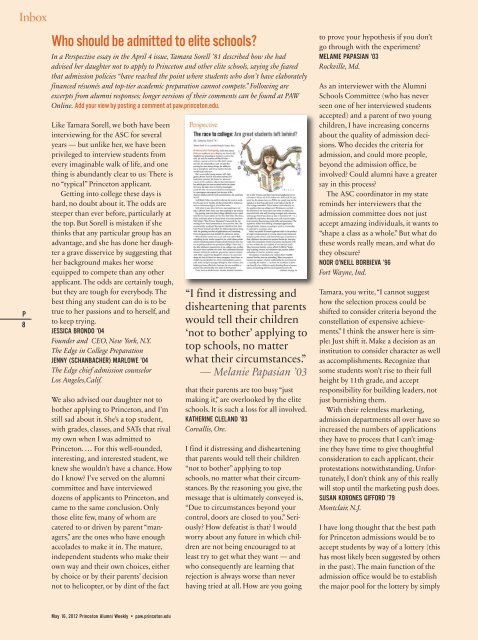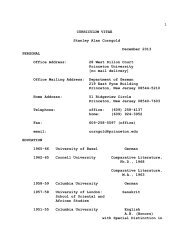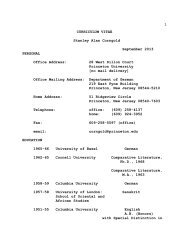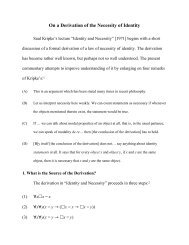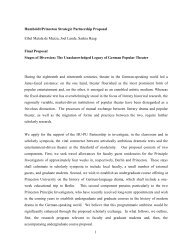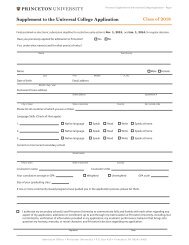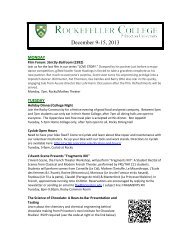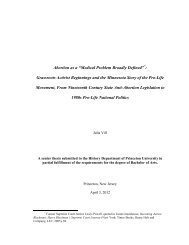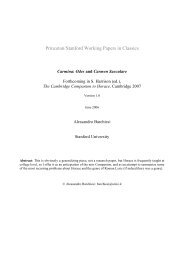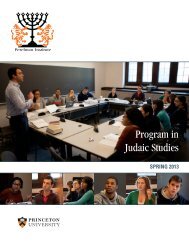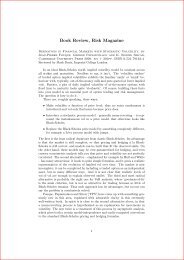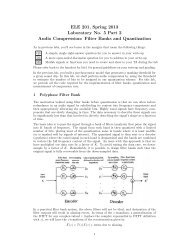Campaign residen the P -litics - Princeton University
Campaign residen the P -litics - Princeton University
Campaign residen the P -litics - Princeton University
You also want an ePaper? Increase the reach of your titles
YUMPU automatically turns print PDFs into web optimized ePapers that Google loves.
Inbox<br />
P<br />
8<br />
Who should be admitted to elite schools?<br />
In a Perspective essay in <strong>the</strong> April 4 issue, Tamara Sorell ’81 described how she had<br />
advised her daughter not to apply to <strong>Princeton</strong> and o<strong>the</strong>r elite schools, saying she feared<br />
that admission policies “have reached <strong>the</strong> point where students who don’t have elaborately<br />
financed résumés and top-tier academic preparation cannot compete.” Following are<br />
excerpts from alumni responses; longer versions of <strong>the</strong>ir comments can be found at PAW<br />
Online. Add your view by posting a comment at paw.princeton.edu.<br />
Like Tamara Sorell, we both have been<br />
interviewing for <strong>the</strong> ASC for several<br />
years — but unlike her, we have been<br />
privileged to interview students from<br />
every imaginable walk of life, and one<br />
thing is abundantly clear to us: There is<br />
no “typical” <strong>Princeton</strong> applicant.<br />
Getting into college <strong>the</strong>se days is<br />
hard, no doubt about it. The odds are<br />
steeper than ever before, particularly at<br />
<strong>the</strong> top. But Sorell is mistaken if she<br />
thinks that any particular group has an<br />
advantage, and she has done her daughter<br />
a grave disservice by suggesting that<br />
her background makes her worse<br />
equipped to compete than any o<strong>the</strong>r<br />
applicant. The odds are certainly tough,<br />
but <strong>the</strong>y are tough for everybody. The<br />
best thing any student can do is to be<br />
true to her passions and to herself, and<br />
to keep trying.<br />
JESSICA BRONDO ’04<br />
Founder and CEO, New York, N.Y.<br />
The Edge in College Preparation<br />
JENNY (SCHANBACHER) MARLOWE ’04<br />
The Edge chief admission counselor<br />
Los Angeles,Calif.<br />
We also advised our daughter not to<br />
bo<strong>the</strong>r applying to <strong>Princeton</strong>, and I’m<br />
still sad about it. She’s a top student,<br />
with grades, classes, and SATs that rival<br />
my own when I was admitted to<br />
<strong>Princeton</strong>. ... For this well-rounded,<br />
interesting, and interested student, we<br />
knew she wouldn’t have a chance. How<br />
do I know? I’ve served on <strong>the</strong> alumni<br />
committee and have interviewed<br />
dozens of applicants to <strong>Princeton</strong>, and<br />
came to <strong>the</strong> same conclusion. Only<br />
those elite few, many of whom are<br />
catered to or driven by parent “managers,”<br />
are <strong>the</strong> ones who have enough<br />
accolades to make it in. The mature,<br />
independent students who make <strong>the</strong>ir<br />
own way and <strong>the</strong>ir own choices, ei<strong>the</strong>r<br />
by choice or by <strong>the</strong>ir parents’ decision<br />
not to helicopter, or by dint of <strong>the</strong> fact<br />
May 16, 2012 <strong>Princeton</strong> Alumni Weekly • paw.princeton.edu<br />
“I find it distressing and<br />
disheartening that parents<br />
would tell <strong>the</strong>ir children<br />
‘not to bo<strong>the</strong>r’ applying to<br />
top schools, no matter<br />
what <strong>the</strong>ir circumstances.”<br />
— Melanie Papasian ’03<br />
that <strong>the</strong>ir parents are too busy “just<br />
making it,” are overlooked by <strong>the</strong> elite<br />
schools. It is such a loss for all involved.<br />
KATHERINE CLELAND ’83<br />
Corvallis, Ore.<br />
I find it distressing and disheartening<br />
that parents would tell <strong>the</strong>ir children<br />
“not to bo<strong>the</strong>r” applying to top<br />
schools, no matter what <strong>the</strong>ir circumstances.<br />
By <strong>the</strong> reasoning you give, <strong>the</strong><br />
message that is ultimately conveyed is,<br />
“Due to circumstances beyond your<br />
control, doors are closed to you.” Seriously?<br />
How defeatist is that? I would<br />
worry about any future in which children<br />
are not being encouraged to at<br />
least try to get what <strong>the</strong>y want — and<br />
who consequently are learning that<br />
rejection is always worse than never<br />
having tried at all. How are you going<br />
to prove your hypo<strong>the</strong>sis if you don’t<br />
go through with <strong>the</strong> experiment?<br />
MELANIE PAPASIAN ’03<br />
Rockville, Md.<br />
As an interviewer with <strong>the</strong> Alumni<br />
Schools Committee (who has never<br />
seen one of her interviewed students<br />
accepted) and a parent of two young<br />
children, I have increasing concerns<br />
about <strong>the</strong> quality of admission decisions.<br />
Who decides <strong>the</strong> criteria for<br />
admission, and could more people,<br />
beyond <strong>the</strong> admission office, be<br />
involved? Could alumni have a greater<br />
say in this process?<br />
The ASC coordinator in my state<br />
reminds her interviewers that <strong>the</strong><br />
admission committee does not just<br />
accept amazing individuals, it wants to<br />
“shape a class as a whole.” But what do<br />
<strong>the</strong>se words really mean, and what do<br />
<strong>the</strong>y obscure?<br />
NOOR O’NEILL BORBIEVA ’96<br />
Fort Wayne, Ind.<br />
Tamara, you write, “I cannot suggest<br />
how <strong>the</strong> selection process could be<br />
shifted to consider criteria beyond <strong>the</strong><br />
constellation of expensive achievements.”<br />
I think <strong>the</strong> answer here is simple:<br />
Just shift it. Make a decision as an<br />
institution to consider character as well<br />
as accomplishments. Recognize that<br />
some students won’t rise to <strong>the</strong>ir full<br />
height by 11th grade, and accept<br />
responsibility for building leaders, not<br />
just burnishing <strong>the</strong>m.<br />
With <strong>the</strong>ir relentless marketing,<br />
admission departments all over have so<br />
increased <strong>the</strong> numbers of applications<br />
<strong>the</strong>y have to process that I can’t imagine<br />
<strong>the</strong>y have time to give thoughtful<br />
consideration to each applicant, <strong>the</strong>ir<br />
protestations notwithstanding. Unfortunately,<br />
I don’t think any of this really<br />
will stop until <strong>the</strong> marketing push does.<br />
SUSAN KORONES GIFFORD ’79<br />
Montclair, N.J.<br />
I have long thought that <strong>the</strong> best path<br />
for <strong>Princeton</strong> admissions would be to<br />
accept students by way of a lottery (this<br />
has most likely been suggested by o<strong>the</strong>rs<br />
in <strong>the</strong> past). The main function of <strong>the</strong><br />
admission office would be to establish<br />
<strong>the</strong> major pool for <strong>the</strong> lottery by simply


